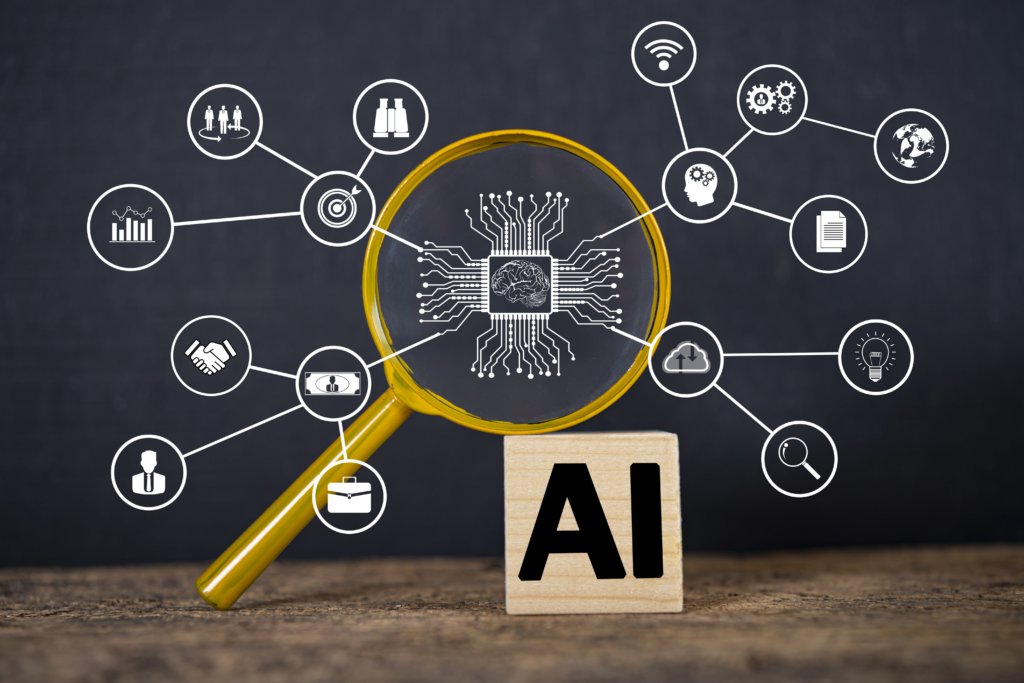Artificial Intelligence (AI) is changing the way we interact with websites. It provides more convenience, personalized content, and a seamless user experience. Whether it’s AI chatbots or intelligent search functions, companies can use AI to engage their customers, save time, and ultimately increase their revenue. But simply adding an AI feature won’t work. The integration should be well thought out and strategic to truly add value without overwhelming users or creating security vulnerabilities. In this guide, you will learn what to consider, from selecting the right tools to complying with data protection standards.
Why You Should Use AI on Your Website
Artificial Intelligence is no longer a topic of the future, it has already become part of our daily lives. Whether in online shopping, reading articles, or customer service, AI is changing how we interact with digital services. And that’s exactly why it’s worth integrating AI into your website. Here are the most important advantages:
- Personalized Approach: With AI-based personalization, your visitors feel directly addressed, whether through suitable product recommendations or content that matches their interests.
- Always Available: Chatbots are available 24/7, answering questions instantly and assisting users even on weekends or at night.
- Better Search Results: Thanks to AI, every user finds what they are looking for, even if they phrase their query imprecisely or make typos.
- Valuable Data and Insights: AI analyzes visitor behavior and provides valuable insights that help you make better decisions.
- More Time Through Automation: Routine tasks such as answering standard questions or sorting inquiries are handled automatically. This frees up your team to focus on more strategic tasks.

These AI Functions Provide Real Added Value
1. Chatbots and Virtual Assistants
Chatbots have become standard on many websites, but they are only truly useful when applied correctly. They can:
- Provide instant answers to frequently asked questions
- Help navigate the site
- Suggest relevant products
- Communicate in multiple languages
The result: Users feel supported even when no staff member is available..
2. Content That Truly Matches
Nothing is more annoying than irrelevant suggestions or random recommendations. This is where AI-driven algorithms come into play: They analyze which products, articles, or services might interest users. Examples:
- In an online shop, similar or complementary products are suggested.
- Blogs and news portals recommend thematically relevant articles to keep readers engaged.
This saves users time and keeps them engaged.
3. A Search That Understands What Is Meant
Traditional search functions are based on keywords. AI, on the other hand, understands the meaning behind a query. This means:
- It recognizes natural language.
- Suggest relevant terms while typing
- Corrects typos
- Delivers results tailored to the user
This increases the chance that visitors will find what they’re looking for, rather than leaving the site frustrated.
4. Image and Voice Recognition
Why type when it can be easier? Thanks to AI, users can:
- Search for products or information using voice search
- Find similar items via image search by uploading a photo
- Even log in securely and quickly using facial recognition
Especially in the mobile sector, these features are a real advantage.

5. Protection Against Fraud and Cyber Attacks
AI also ensures security in the background. It detects unusual behavior and suspicious activities in real-time:
- Fraud detection in online shops protects you from fraudulent transactions
- Anomaly detection reports unusual login attempts before damage occurs
- Spam filters keep your comment sections and forms clean
This means your users can feel safe – an important trust factor for any website.
How to Integrate AI Effectively on Your Website – Practical Tips
Artificial intelligence is a game-changer. It can make your website smarter, engage users better, and boost your long-term success. But be careful because simply adding an AI tool is not enough. You need a strategy to get more effective results on your website.
1. Know What You Want to Achieve with AI
Before you start, sit down and think carefully: What should AI accomplish for your website? Without clear goals, it will be difficult to measure success later. Ask yourself questions like:
- What problems on my website can AI help solve?
- How exactly can AI simplify or improve the user experience?
- How will I measure whether the integration is successful (e.g., more conversions, longer visit times)?
If you can answer these questions, you’re already a big step ahead.
2. Choosing the Right Tools – Not Always Easy, but Important
There are countless AI solutions out there. To avoid getting overwhelmed, focus on tools that fit your website and your needs. Pay attention to the following points:
- Easy integration: The tool should seamlessly fit into your existing system without major modifications.
- Scalability: As your website traffic grows, the AI should be able to keep up.
- User-friendliness: No one wants to call a developer for every small adjustment. Choose something your team can easily manage.
- Security: Ensure that the solution complies with all data protection regulations (such as GDPR) and keeps user data safe.
3. Data Protection Is Not Optional – It’s a Must
AI works with data, which is often very sensitive data. That’s why you need to ensure that it is securely stored and processed. Users must be able to trust that their privacy is protected. You can achieve this with the following measures:
- Transparency: Clearly explain how you collect data and what it is used for. Nobody likes hidden data collection.
- Secure storage: Encrypt the data and use secure storage locations to prevent hacker attacks.
- Regular reviews: Check your systems regularly for vulnerabilities and apply security updates.
- Legal compliance: Follow the relevant data protection regulations. Otherwise, you risk penalties and losing user trust.
4. Users Come First – Always!
It’s tempting to use AI for everything. But remember: in the end, users should benefit. If the AI is complicated or even disruptive, it defeats its purpose.
- Helpful, not annoying: AI should support users without distracting or frustrating them.
- Human-like interactions: Chatbots are great as long as they feel like real conversation partners. Robotic, emotionless responses turn most people away.
- User control: Let users decide. Offer them the option to disable certain AI features if they want to.
5. Test, Test, Test – and Keep Improving
AI is not a “set-it-and-forget-it” solution. It needs to be continuously tested and optimized. This is the only way to ensure it performs well in the long run.
- A/B testing: Test how AI features affect user behavior and compare different versions.
- Gather feedback: Your users know best whether AI is really helpful. Ask them directly for their opinions.
- Frequent updates: AI systems improve the more data they process. Keep them up to date.
6. Stay Up to Date
AI evolves rapidly and what’s new today may be outdated tomorrow. That’s why you should routinely check for new developments. Here’s how:
- Read news and blogs: Stay informed about the latest AI trends through industry articles and reports.
- Attend conferences and expos: Learn from other experts and get hands-on insights into the latest advancements.
- Join communities: Engage in forums and networks to exchange experiences and learn from others.
7. Measure the Success of Your AI Integration
Using AI without measuring success is like driving without a destination. Regularly check whether your goals are being met. Here are some key metrics to track:
- User engagement: Do visitors stay on your website longer? Do they click on recommended content more often?
- Conversion rates: Does AI lead to more sales or generated leads?
- Customer service efficiency: Do chatbots respond faster and effectively solve issues?
- Search function: Do users find what they’re looking for more quickly, and are they satisfied with the results?

Challenges in AI Integration and How to Overcome Them
Integrating AI into your website offers many opportunities, but it also comes with challenges. High costs can be avoided by starting with small, cost-effective solutions and expanding later. Data privacy is crucial because it secures data with encryption and complies with legal regulations to build trust. If technical expertise is lacking, user-friendly tools or external professionals can help. To gain user acceptance, explain AI features clearly and provide support.
AI and SEO: How AI Improves Your Website's Ranking
AI is a game changer for SEO as well. It optimizes content with targeted keywords, improves visibility for voice searches, and automatically generates metadata for images and videos. Even content creation can be accelerated with AI, complemented by human refinement.
The Future of AI in Web Development
The future holds exciting possibilities such as hyper-personalized content, AI-powered website builders without coding, virtual product testing through AR, and even emotion recognition that adapts to individual users. AI could make websites even smarter and more user-friendly—if integrated wisely, it will bring long-term benefits.
Conclusion
Integrating AI functions is more than just a technical upgrade. It offers the opportunity to make your digital offerings smarter, more efficient, and more personalized. But success requires a strategic approach: set clear goals, choose the right tools, and keep your users at the center. AI can not only enhance your website’s functionality but also strengthen long-term connections with visitors.
FAQs:
1. Which AI feature should I integrate first on my website?
That depends on your website’s needs. Popular options include AI chatbots, personalized recommendations, smart search functions, and fraud detection systems.
2. Can AI really improve my SEO?
Yes! AI optimizes content, enhances search functionality, and keeps users engaged longer. All of these factors positively impact SEO rankings.
3. How does AI help with customer service?
AI chatbots and virtual assistants can answer questions 24/7, reducing wait times and improving customer satisfaction.
4. Is AI integration expensive?
It depends on the tools and complexity. However, there are affordable solutions for small businesses that are easy to implement.
5. Does AI make my website more secure?
Absolutely! AI detects cyberattacks, suspicious activities, and potential security vulnerabilities in real time which minimizes risks and protects your data.



